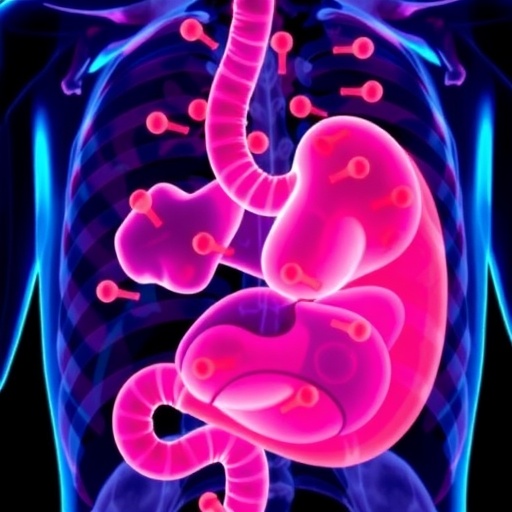In a landmark meta-analysis published in BMC Cancer, researchers have unveiled compelling evidence that integrating targeted therapy and immunotherapy with conventional neoadjuvant chemotherapy significantly enhances treatment outcomes for patients with locally advanced gastric cancer (LAGC). This comprehensive study synthesizes data from multiple clinical trials, illuminating new pathways for improving the radical resection rate and long-term prognosis of a disease notorious for its poor survival rates and complex management challenges.
Gastric cancer remains a formidable global health burden, ranking among the leading causes of cancer-related mortality. Surgical resection is often the cornerstone of curative treatment, yet the success of surgery hinges critically on effective tumor downstaging prior to surgery. Neoadjuvant chemotherapy (NCT) has been employed to reduce tumor burden, but its efficacy alone has proven limited in achieving pathological complete response (pCR) and maximizing R0 resection rates, where no residual tumor cells are found at resection margins.
Addressing these limitations, the emerging roles of molecular targeted therapies and immunotherapies have revolutionized cancer treatment paradigms across multiple tumor types. Their integration with traditional chemotherapy aims to exploit synergistic mechanisms—targeted therapies interfere with specific oncogenic pathways, while immunotherapies activate the host’s immune defenses against malignant cells. Despite promising preliminary results, the optimal combination strategy for LAGC remained uncertain until now.
The meta-analysis conducted by Liang et al. evaluated 21 clinical studies encompassing both randomized controlled trials (RCTs) and non-randomized studies. Utilizing rigorous network meta-analysis techniques, the researchers compared the therapeutic benefits and safety profiles of four neoadjuvant regimens: chemotherapy alone (NCT), neoadjuvant immunotherapy plus chemotherapy (NICT), NCT combined with targeted therapy (NCTT), and the trimodal approach of NICT plus targeted therapy (NICTT).
Strikingly, results demonstrated that the triple combination regimen (NICTT) achieved the highest rates of pathological complete response and major pathological response (MPR), as well as superior R0 resection rates relative to chemotherapy alone. These metrics are crucial prognostic indicators, with higher pCR and MPR rates correlating to improved overall survival and relapse-free intervals. The NICT and NCTT groups also showed favorable outcomes compared to NCT alone, underscoring the added value of incorporating novel agents into preoperative treatment protocols.
However, the benefits of intensified neoadjuvant therapy were counterbalanced by increased treatment-related adverse events (TRAEs). The NICTT and NCTT groups experienced higher incidences of severe toxicity, highlighting the imperative for meticulous patient selection and vigilant management of side effects. Interestingly, patients receiving NICT and NCTT demonstrated lower two-year recurrence rates, suggesting that despite potential toxicities, these regimens might confer durable disease control.
The network meta-analysis framework employed allowed for direct and indirect comparisons across different studies, providing a robust hierarchy of therapeutic efficacy. The superiority of the NICTT regimen emerged consistently, spotlighting its potential to become the new standard of care. Nevertheless, the complexity of combining immunomodulation and targeted pathway interference calls for further high-quality clinical trials to validate these findings and optimize dosing schedules.
The advent of immunotherapy, particularly immune checkpoint inhibitors, has transformed the therapeutic landscape of several malignancies by harnessing the immune system to combat cancer. When fused with targeted therapies that inhibit specific molecular drivers of tumor growth—such as HER2 or VEGF pathways—there is a possibility to overcome resistance mechanisms that often limit single-agent efficacy. This study’s findings resonate with the growing consensus that multimodal treatment strategies can produce synergistic tumor eradication effects.
Innovations in biomarker-driven patient stratification could further enhance the precision of neoadjuvant therapy for LAGC. Identifying patients likely to benefit from the NICTT regimen, while sparing others from undue toxicity, remains a key challenge. Insights from molecular profiling and immune landscape characterization will be critical in tailoring treatment approaches and improving risk-benefit ratios.
Moreover, the improved downstaging rates achieved by combining immunotherapy and targeted agents with chemotherapy may lead to higher rates of successful radical resections, offering hope for more patients to achieve long-term remission. These advancements underscore a paradigm shift toward personalized, biology-driven interventions that transcend the one-size-fits-all model of cancer care.
While the promise of integrated neoadjuvant regimens is undeniable, caution is warranted. The increased incidence of adverse events necessitates development of comprehensive supportive care protocols and refined treatment algorithms. Future studies should incorporate quality of life assessments and cost-effectiveness analyses to holistically appraise the impact of these novel therapeutic combinations.
In conclusion, this meta-analysis paves the way for an era where the convergence of chemotherapy, targeted therapy, and immunotherapy forms the backbone of effective neoadjuvant strategies in locally advanced gastric cancer. As precision oncology continues to evolve, embracing multimodal approaches holds the potential to dramatically improve survival outcomes and redefine standards of care for this challenging malignancy. The oncology community eagerly anticipates further confirmatory trials that will translate these insights into actionable clinical paradigms.
Subject of Research: Evaluation of the therapeutic efficacy and safety of multiple neoadjuvant regimens involving chemotherapy, targeted therapy, and immunotherapy in locally advanced gastric cancer patients.
Article Title: Therapeutic efficacy of multiple neoadjuvant regimens involving targeted therapy, immunotherapy and chemotherapy in gastric cancer: a systematic review and meta-analysis
Article References:
Liang, C., Yu, Z., Hou, S. et al. Therapeutic efficacy of multiple neoadjuvant regimens involving targeted therapy, immunotherapy and chemotherapy in gastric cancer: a systematic review and meta-analysis. BMC Cancer 25, 1694 (2025). https://doi.org/10.1186/s12885-025-15136-2
Image Credits: Scienmag.com
DOI: 10.1186/s12885-025-15136-2 (Published 03 November 2025)




